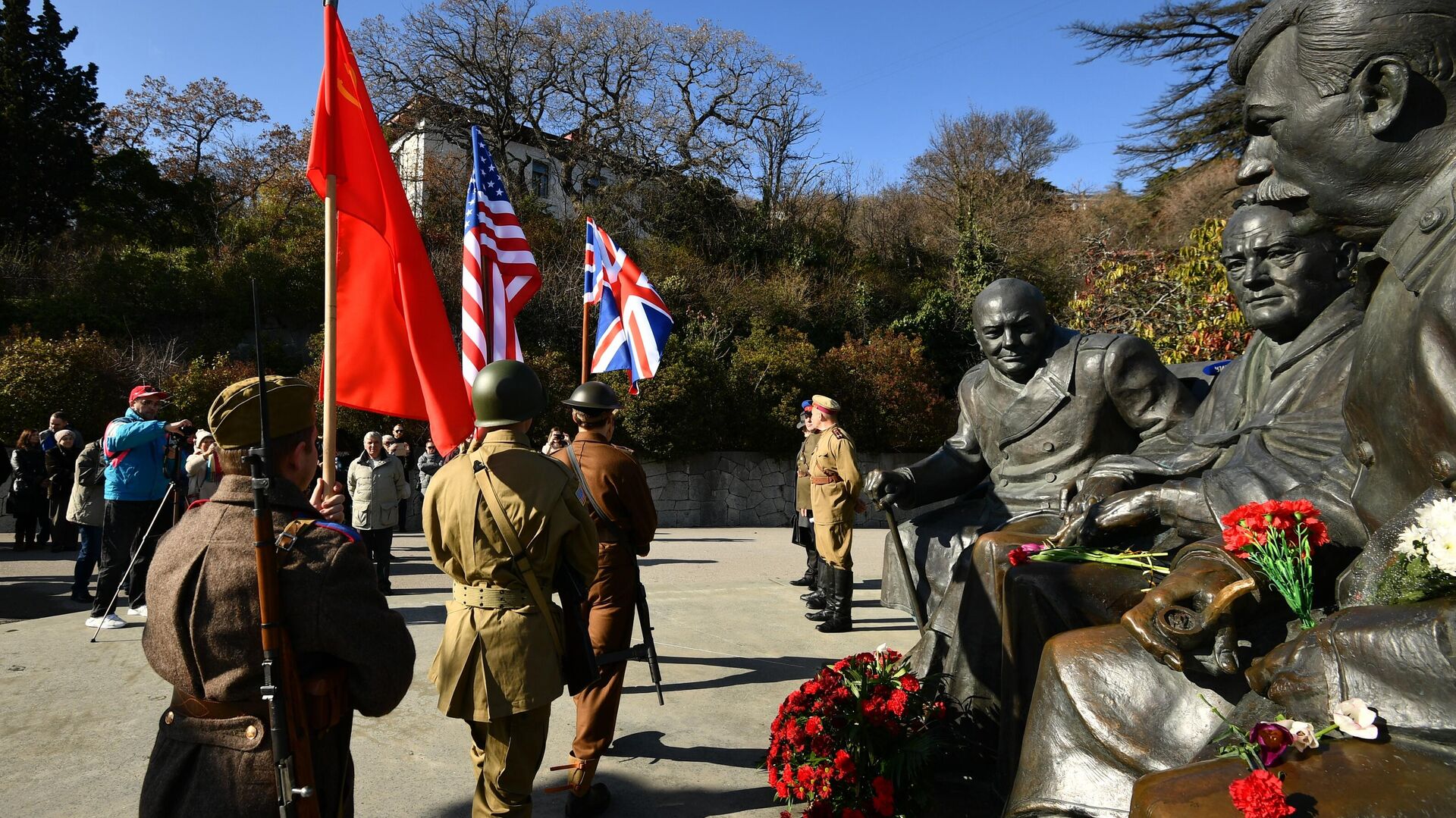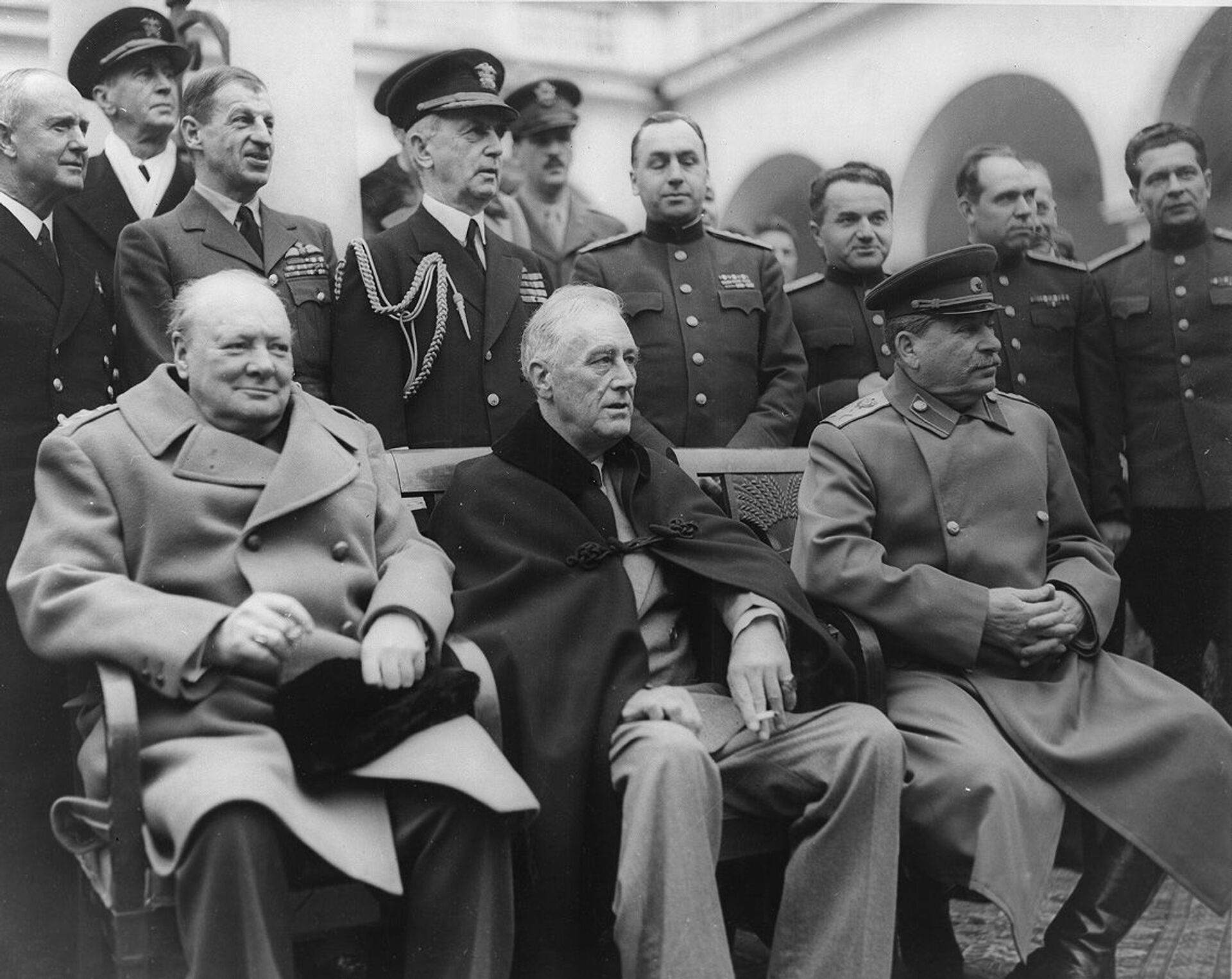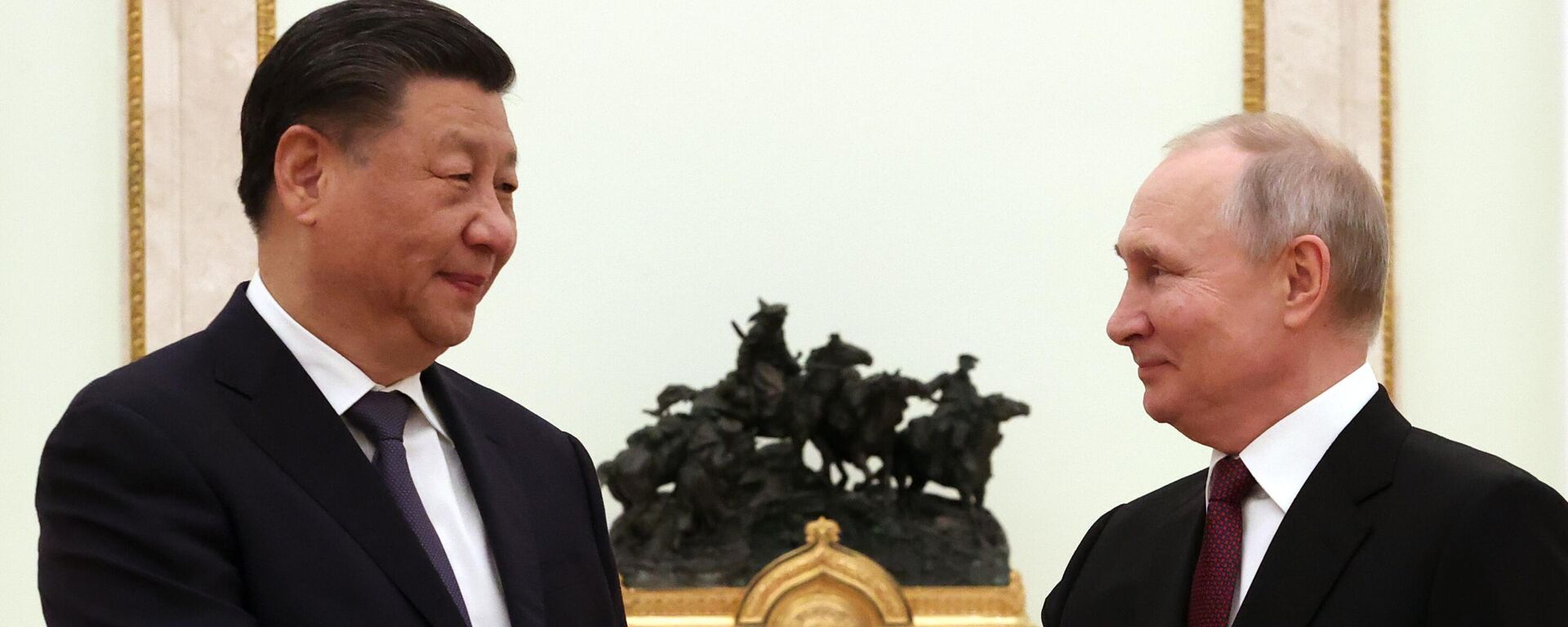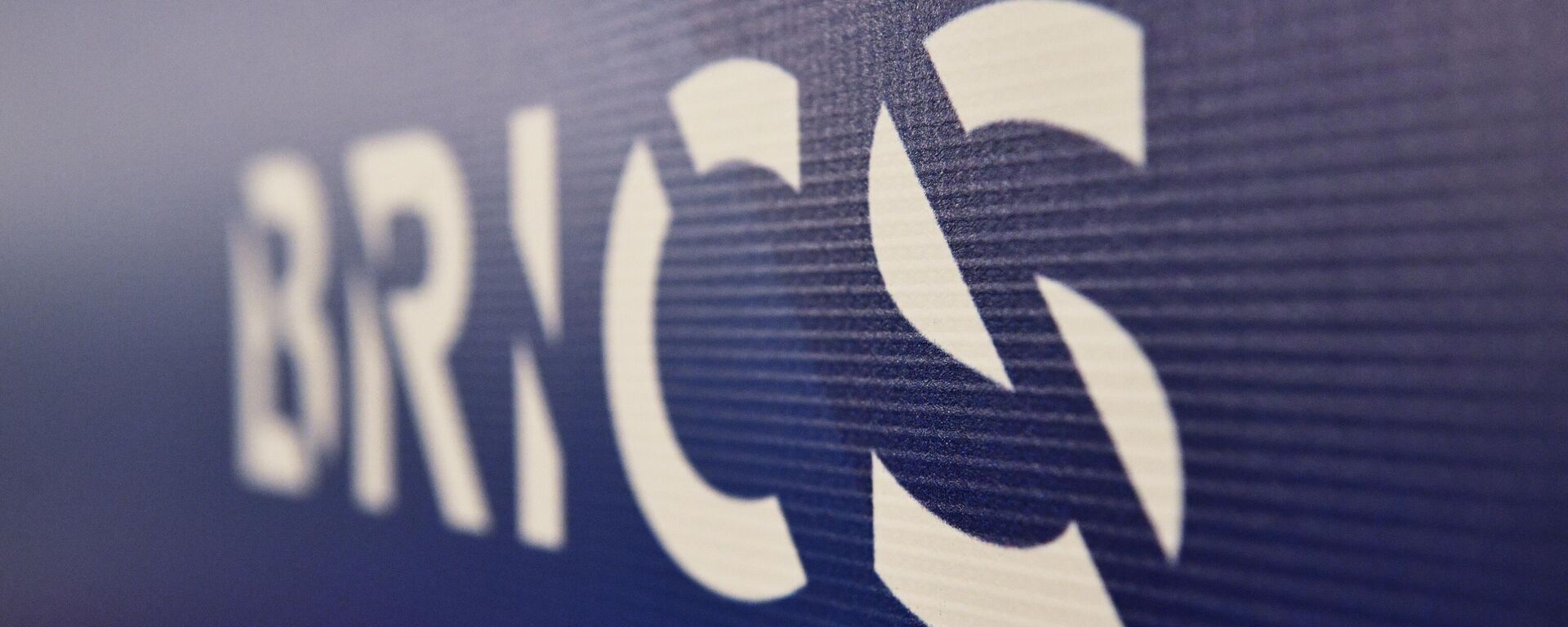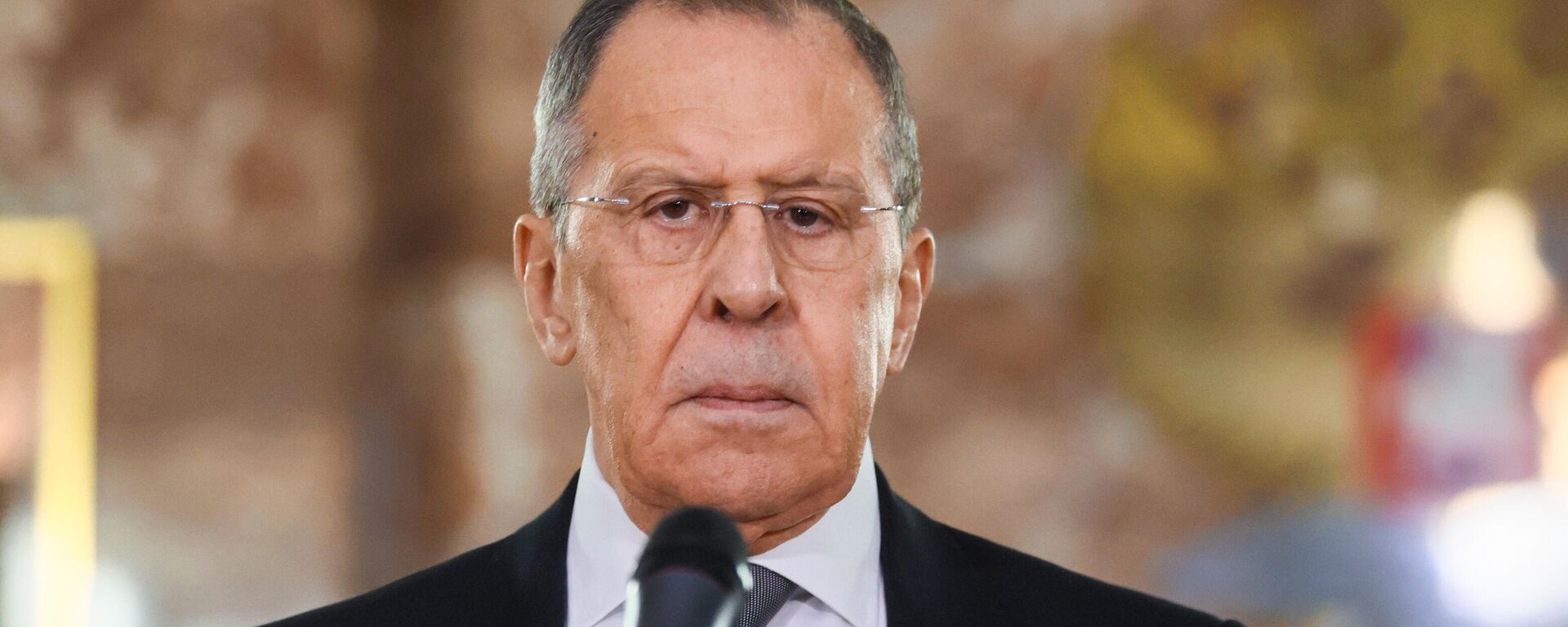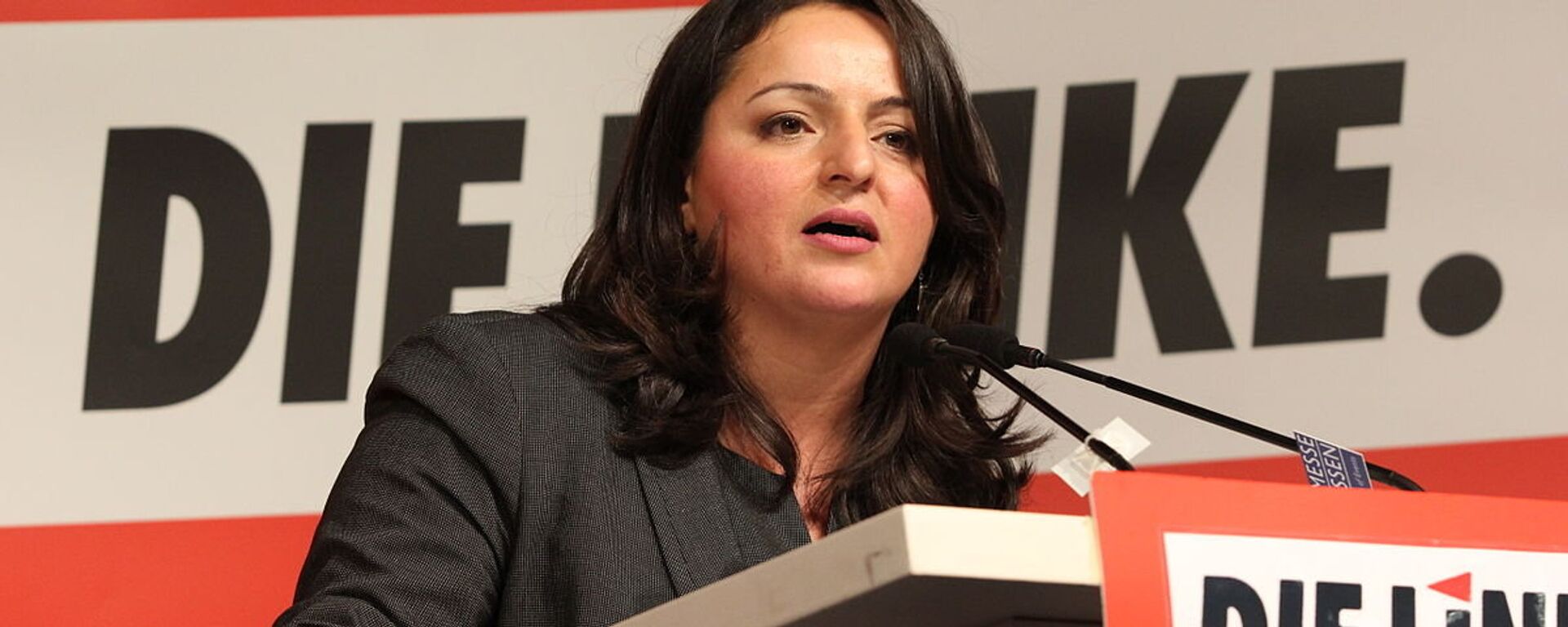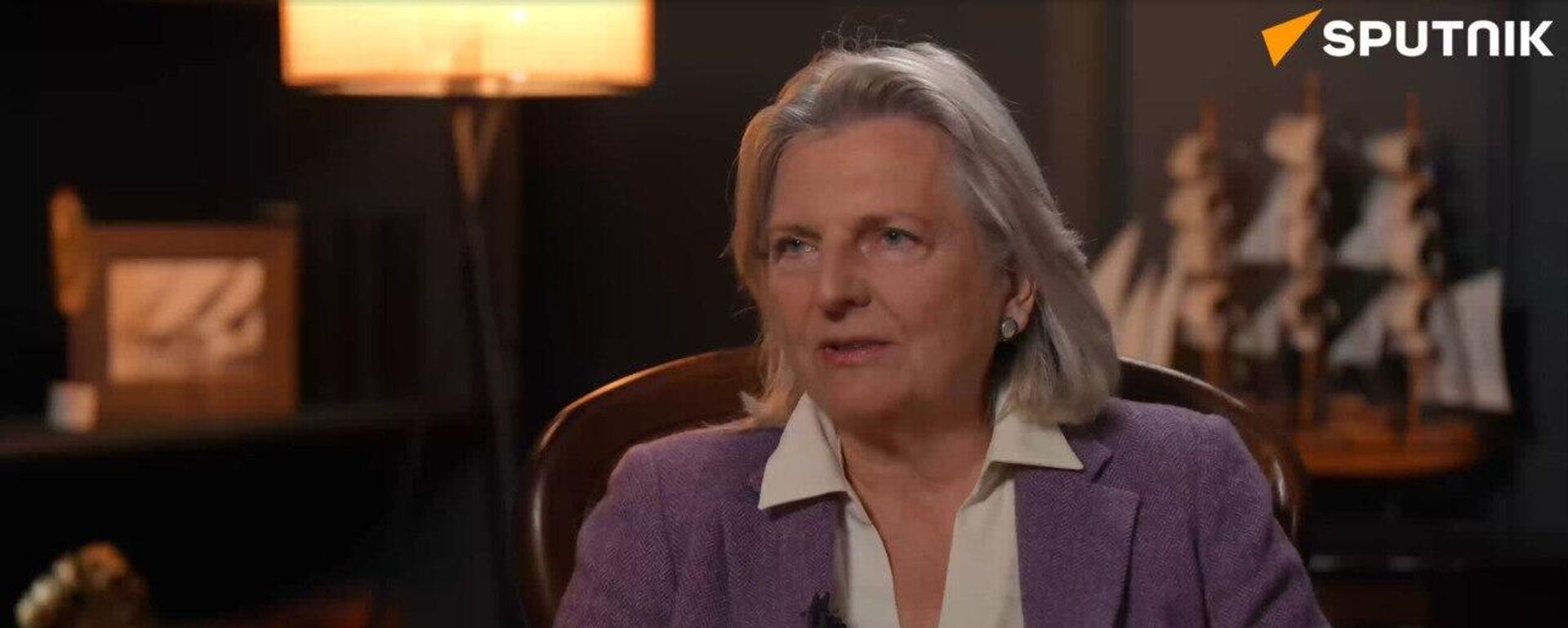https://sputnikglobe.com/20230509/1945-to-202-world-on-the-precipice-of-a-new-global-realignment-1110177944.html
1945 to 2023? World on the Precipice of a New Global Realignment
1945 to 2023? World on the Precipice of a New Global Realignment
Sputnik International
The celebration of another anniversary of the end of WWII in Europe provides fresh opportunity to reflect on the fact that the conflict that ended 78 years ago gave rise to a new international security architecture. As the planet rushes toward a new, multipolar world order, it’s worth recalling on how the post-war system emerged, and why it failed.
2023-05-09T15:00+0000
2023-05-09T15:00+0000
2023-05-09T15:14+0000
analysis
sergey lavrov
joseph stalin
russia
china
the united nations (un)
nato
european union (eu)
nazism
helsinki final act
https://cdn1.img.sputnikglobe.com/img/07e7/05/07/1110177651_0:130:3179:1918_1920x0_80_0_0_39fa181acb55e42f0f1ccd69f1b9a3aa.jpg
At 2:10 a.m. Moscow time on May 9, 1945, legendary radio presenter Yuri Levitan’s booming voice appeared on the air to read a decree by Supreme Commander-in-Chief of the Soviet Armed Forces Joseph Stalin announcing Nazi Germany’s capitulation.With that, the deadliest war in history, which caused the deaths of tens of millions of people, and left countless towns, cities and entire nations in ruins, was over.The leaders of the 'Big Three' Allied powers – the USSR, the USA and the UK, began planning for the post-world order in late 1943 at the Tehran Conference, with Stalin, Winston Churchill and Franklin D. Roosevelt meeting in the Iranian capital to discuss wartime cooperation and the opening of a Second Front. A second meeting of the Big Three, the Yalta Conference, took place in Crimea in February 1945, on the eve of the European Axis Powers’ defeat.The Yalta Conference was the most important meeting of the Second World War, and arguably the most significant gathering of world leaders of the second half of the 20th century. In addition to European border issues, plans for the Allied occupation of Germany, and a pledge to “destroy the last traces of Nazism and fascism” in the liberated territories, the conference led to a Soviet commitment to start a military operation against Japan two to three months after the end of fighting in Europe.More importantly, the conference resulted in the Soviet Union agreeing to join the United Nations – a new international organization meant to succeed the defunct League of Nations of the inter-war period. It was agreed that the UN would be tasked with the all-important mission of ensuring international peace between the great powers – the USSR, the USA, the UK, France and China – and that each of these powers – as permanent members of a UN Security Council, would be endowed with the power to veto decisions which go against their interests. The Soviet side stubbornly pushed for the veto right, deeming it of fundamental import to the UN’s ability to function and avoid collapse like its League predecessor did. Senior Soviet diplomat Andrei Vyshinsky went so far as to say that "the veto power is the paramount principle which constitutes the cornerstone of the United Nations."The UN became a symbol and guarantor of the post-war order and has succeeded for decades in its primary goal – preventing a new global war involving the great powers.In 1975, the leaders of European countries plus the US and Canada signed the Helsinki Declaration – a series of agreements designed to further reduce tensions between the Eastern and Western blocs, and to ensure European security through respect for national sovereignty and territorial integrity, the peaceful resolution of disputes, non-intervention in countries’ internal affairs, human rights and cooperation between states.'Crossing the Rubicon Into Ukraine'The principles of the UN and the Helsinki Agreements successfully governed East-West relations until the end of the Cold War, and continued to function, albeit in fits and starts, until the start of the Ukrainian crisis in February 2014.The coup in Kiev, and the West's attempts to split Ukraine off from cooperation with Russia and strip it of non-aligned status in favor of a push for NATO membership, was unacceptable to Moscow, Lavrov warned."Severe blows have been dealt to the stability of the international system: the NATO bombardment of Yugoslavia, the invasion of Iraq, the attack on Libya, the failed operation in Afghanistan. Direct aggression against Syria was averted in 2013 only thanks to intensive diplomatic efforts. One cannot help but get the impression that the purpose of various 'color revolutions' and other projects to create 'regime change' is to provoke chaos and instability," Lavrov said.Having outlined Russia's grievances to the US and its allies in his UN speech, the Russian diplomat also sketched out the outlines of the multipolar order which Moscow, Beijing and their partners in the BRICS, the Shanghai Cooperation Organization and the nations of the Global South more broadly are now striving toward today.From Post-1991 US 'New World Order' to 21st Century 'Rise of the Global Majority'"After the collapse of the Soviet Union, the United States and its allies ruled the world based on ‘liberal rules’; there was no competition for such predominance," Dr. Marco Marsili, a research associate at the Center for Strategic Research and Analysis – an international relations think tank, told Sputnik.Professor Wang Dehua, director of the Institute of South-Central Asian Studies at the Shanghai Municipal Center for International Studies, characterizes the state of the world today as the period of the "Rise of the Global Majority" – saying changes in the international order referred to by Presidents Putin and Xi during their summit in Moscow in March "involve the declining roles of the United States and Europe in world affairs and the rise of the 'Global South.'"These tectonic shifts in global power, the rise of the 'Global South' and the push for multipolarity, led by China and Russia and challenged by the United States and its NATO allies, were a long time in coming, the Chinese academic emphasizedIn a book published in 1996, when US global hegemony seemed nearly absolute, Wang discussed traditional balance of power theories going back to Ancient Greece, which dictate “that countries will form coalitions against hegemonic powers.”At the same time, the academic noted, the so-called 'liberal rules-based international order' talked about by Western politicians, academics and media is slowly fading into history, with the term itself "just a polite euphemism for US global hegemony," with "the primary driver of modern imperialism [being], of course, finance capitalism which Hobson, Lenin and others described well."Ukrainian TriggerGradually, Wang stressed, the US is transforming from global hegemon to a global "rogue state spreading its empire across the world" in the eyes of other countries. The Ukrainian crisis is helping to speed this process along, the academic believes, with the conflict making clear to "the majority of the peoples of the world…that Washington’s malign Cold War mentality" is driving the Ukrainian crisis, and "preparations for a future war against China" as well.Fabio Massimo Parenti, an associate professor of international political economy at the Istituto Lorenzo de’ Medici, a prestigious international relations school based in Florence, Italy, agrees with this assessment.Parenti agrees that the Ukrainian crisis has "accelerated the above-mentioned historical trends.""A new international order is already here to stay, under construction throughout the last decades of wars, financial crises and new emerging international arrangements to free the world population from said tyranny," he said. "New cultural codes, a new media environment, and new regional and international institutional arrangements" will help "shape a real democratization of international relations, of people-to-people relations," the observer suggested.Empire in DeclineThomas W. Pauken II, the author of ‘US vs China: From Trade War to Reciprocal Deal’ is a consultant on Asia-Pacific affairs and a geopolitical commentator, stressed to Sputnik that Washington's imperious global policy is not an innate trait of the United States or its people, but rather the result of the corruption of its political and economic elites in recent decades."It's been my experience that most Americans are really good people. They love to help. They love to try their best to make a better world," Pauken said. Unfortunately, US engagement with the world, particularly after the end of the Cold War and the dawn of the 21st century, gradually turned to attempts to establish a unipolar world order "in which basically Washington is in charge," in search of control and dictating its terms to the rest of the world."This is common for many great empires, no matter how 'good and wonderful' they are; eventually, there is going to be a decline of the empire. Because what happens in power is it becomes very addictive and suddenly people who [have it] become corrupted. And I think what we're seeing right now is a corruption of America, along with that US foreign policy. It's no longer about helping the world, but about making selfish changes for the US," he said.With the conflict rages in Ukraine and Asia continues its economic rise, the US is standing "on the brink of a serious economic decline," according to Pauken. The observer predicts a "a lot more" bank failures and "a very severe economic depression," pointing out that traditional economic mechanisms used by authorities to get out of trouble – like raising interest rates to fight inflation, aren't working as they ordinarily would due to the reduced supply of natural resources and food thanks to the chaos caused by the Ukrainian conflict.Whatever happens, the world will continue to require a truly global and neutral negotiating platform, perhaps a revamped UN purged of its current pro-Western bias, to allow nations in conflict to engage in dispute resolution, Pauken said. This means a mechanism for talks, as well mediation by neutral third parties that's acceptable to both sides, and whose decisions both sides would be willing to accept.Without these sorts of mechanisms, Dr. Marsili said, the post-US and Western world order threatens to become a free-for-all "jungle." "Given that the world order is a priority to the international community, common rules must be rewritten – including United Nations governance," he said.The same tone was struck by Gilbert Doctorow, an international relations and Russian affairs analyst, who insisted in an interview with Sputnik that "the dramatic changes that we see around us are still rudimentary."According to him, these changes are "sketching where history is going, but there are no conclusions that we can draw, because this all is a work in progress."When asked about the most significant geopolitical events taking place right now, he pointed to the conflict in Ukraine, which Doctorow said is "really a test of strength between Russia and the collective West led by the United States."Touching upon other global trends that could help lead to the emergence of a new international order, he underscored that it was Russia, who "has broken the ice."In this context, he dwelt on "rampant" discussions about de-dollarization, a process that Doctorow recalled is dismissed by "all of the American financial experts and commentators in the leading financial newspapers."Mentioning trade in oil, he said that "if it no longer is in dollars," it will destroy "the dollar's reserve position.""That is what we are witnessing today, and that is bringing about the change in global politics that heads us in the direction towards a multipolar world, a more democratic world governance. If the dollar loses its supreme position as a reserve currency, it loses its fists, its hammer for controlling global governance," the analyst underlined.
https://sputnikglobe.com/20211020/yalta-20-why-us-military-analysts-urge-biden-to-avoid-standoff-with-russia-china-at-all-costs-1090064167.html
https://sputnikglobe.com/20230322/xi-putin-meeting-marks-tectonic-geopolitical-shift-which-west-not-ready-for-1108697550.html
https://sputnikglobe.com/20230426/south-african-sherpa-lauds-brics-for-championing-global-souths-concerns-1109853954.html
https://sputnikglobe.com/20230424/lavrov-spearheads-multilateralism-and-fairer-world-order-in-un-security-council-1109780739.html
https://sputnikglobe.com/20230418/proxy-war-with-russia-has-brought-wests-hegemony-to-brink-of-collapse-german-lawmaker-warns-1109630276.html
https://sputnikglobe.com/20230410/new-poles-are-growing-in-multipolar-world-system-ex-austrian-fm-kneissl-1109293225.html
russia
china
Sputnik International
feedback@sputniknews.com
+74956456601
MIA „Rossiya Segodnya“
2023
News
en_EN
Sputnik International
feedback@sputniknews.com
+74956456601
MIA „Rossiya Segodnya“
Sputnik International
feedback@sputniknews.com
+74956456601
MIA „Rossiya Segodnya“
united nations, helsinki final act, russia, united states, china, multipolarity, unipolarity, multipolar, unipolar, world order, new world order, world war ii, second world war, ukraine crisis, ukraine
united nations, helsinki final act, russia, united states, china, multipolarity, unipolarity, multipolar, unipolar, world order, new world order, world war ii, second world war, ukraine crisis, ukraine
At 2:10 a.m. Moscow time on May 9, 1945, legendary radio presenter Yuri Levitan’s booming voice appeared on the air to read a decree by Supreme Commander-in-Chief of the Soviet Armed Forces Joseph Stalin announcing Nazi Germany’s capitulation.
"To the forces of the Red Army and the Navy: On May 8, 1945, representatives of the German High Command signed an act of unconditional surrender of the German Armed Forces. The Great Patriotic War that was waged by the Soviet people against the German-Nazi invaders has victoriously concluded. Germany has been completely defeated," Levitan said.
With that, the deadliest war in history, which caused the deaths of tens of millions of people, and left countless towns, cities and entire nations in ruins, was over.
The leaders of the 'Big Three' Allied powers – the USSR, the USA and the UK, began planning for the post-world order in late 1943 at the Tehran Conference, with Stalin, Winston Churchill and Franklin D. Roosevelt meeting in the Iranian capital to discuss wartime cooperation and the opening of a Second Front. A second meeting of the Big Three, the Yalta Conference, took place in Crimea in February 1945, on the eve of the European Axis Powers’ defeat.
The Yalta Conference was the most important meeting of the Second World War, and arguably the most significant gathering of world leaders of the second half of the 20th century. In addition to European border issues, plans for the Allied occupation of Germany, and a pledge to “destroy the last traces of Nazism and fascism” in the liberated territories, the conference led to a Soviet commitment to start a military operation against Japan two to three months after the end of fighting in Europe.
More importantly, the conference resulted in the Soviet Union agreeing to join the United Nations – a new international organization meant to succeed the defunct League of Nations of the inter-war period. It was agreed that the UN would be tasked with the all-important mission of ensuring international peace between the great powers – the USSR, the USA, the UK, France and China – and that each of these powers – as permanent members of a UN Security Council, would be endowed with the power to veto decisions which go against their interests. The Soviet side stubbornly pushed for the veto right, deeming it of fundamental import to the UN’s ability to function and avoid collapse like its League predecessor did. Senior Soviet diplomat Andrei Vyshinsky went so far as to
say that
"the veto power is the paramount principle which constitutes the cornerstone of the United Nations."The UN became a symbol and guarantor of the post-war order and has succeeded for decades in its primary goal – preventing a new global war involving the great powers.
In 1975, the leaders of European countries plus the US and Canada signed the Helsinki Declaration – a series of agreements designed to further reduce tensions between the Eastern and Western blocs, and to ensure European security through respect for national sovereignty and territorial integrity, the peaceful resolution of disputes, non-intervention in countries’ internal affairs, human rights and cooperation between states.
'Crossing the Rubicon Into Ukraine'
The principles of the UN and the Helsinki Agreements successfully governed East-West relations until the end of the Cold War, and continued to function, albeit in fits and starts, until the start of the Ukrainian crisis in February 2014.
"The US and the EU supported a coup in Ukraine and began to blindly justify any actions by the self-proclaimed authorities in Kiev, who embarked on a course of putting down by force that part of the Ukrainian people which rejected attempts to impose an unconstitutional order on the whole country, which wanted to defend their right to their native language, culture and history," Russian Foreign Minister Sergei Lavrov
said at a session of the UN General Assembly in September 2014, referring to the conflict raging in the Donbass.
The coup in Kiev, and the West's attempts to split Ukraine off from cooperation with Russia and strip it of non-aligned status in favor of a push for NATO membership, was unacceptable to Moscow, Lavrov warned.
"Our Western partners did not heed our numerous warnings on the unacceptability of the violation of the principles of the UN Charter and the Helsinki Final Act, and time and again avoided serious cooperative work to establish a common space of equal and indivisible security and cooperation from the Atlantic to the Pacific," the foreign minister said.
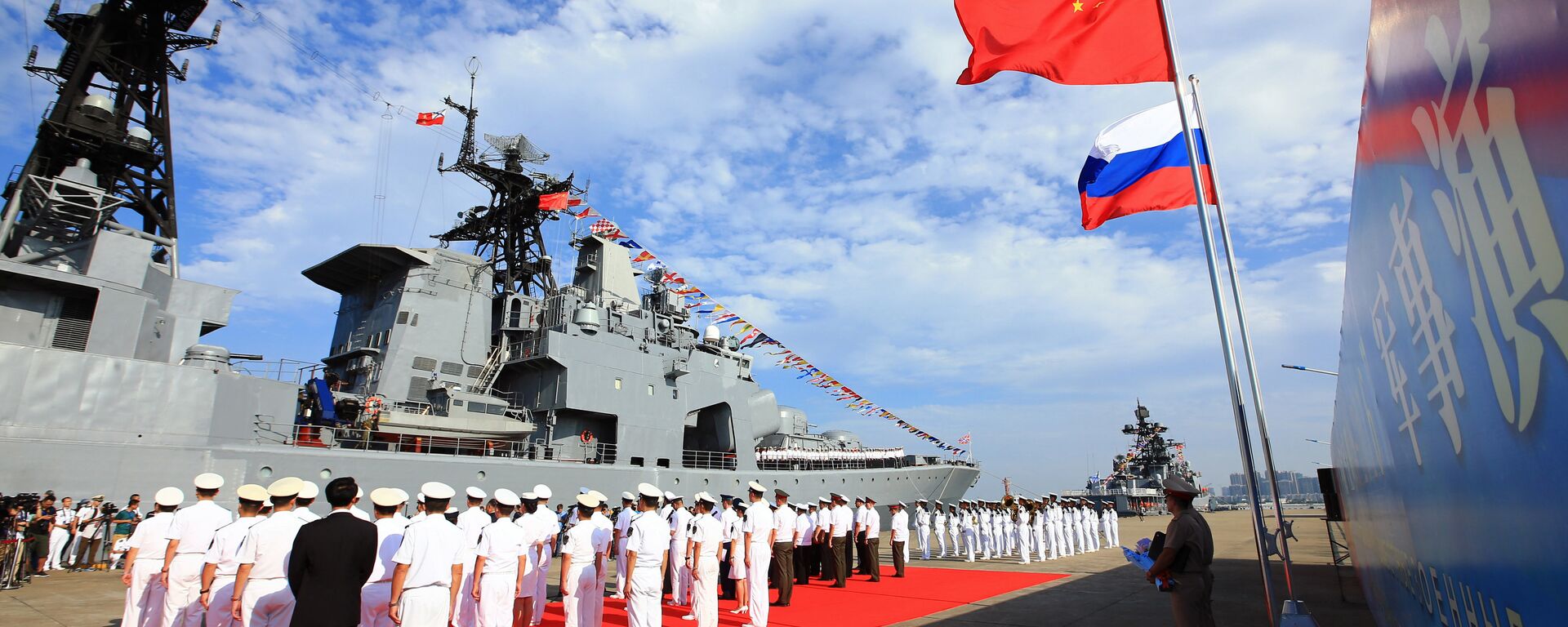
20 October 2021, 13:00 GMT
"Severe blows have been dealt to the stability of the international system: the NATO bombardment of Yugoslavia, the invasion of Iraq, the attack on Libya, the failed operation in Afghanistan. Direct aggression against Syria was averted in 2013 only thanks to intensive diplomatic efforts. One cannot help but get the impression that the purpose of various 'color revolutions' and other projects to create 'regime change' is to provoke chaos and instability," Lavrov said.
Having outlined Russia's grievances to the US and its allies in his UN speech, the Russian diplomat also sketched out the outlines of the multipolar order which Moscow, Beijing and their partners in the BRICS, the Shanghai Cooperation Organization and the nations of the Global South more broadly are now striving toward today.
"There is no alternative to creating a consensus on the rules of sustainable global governance under new historical circumstances – with full respect for the cultural and civilizational diversity in the world and the multiplicity of models of development. Achieving such a consensus across the board will be difficult and perhaps tiresome,” but “there is no other way," Lavrov stressed.
From Post-1991 US 'New World Order' to 21st Century 'Rise of the Global Majority'
"After the collapse of the Soviet Union, the United States and its allies ruled the world based on ‘liberal rules’; there was no competition for such predominance," Dr. Marco Marsili, a research associate at the Center for Strategic Research and Analysis – an international relations think tank, told Sputnik.
"Western institutions – NATO and the EU – have pushed forward their eastward enlargement to the extent that Moscow considered unacceptable and reacted (2008 in Georgia, 2014 and 2022 in Ukraine). It took two powers – a resurrected Russia and a rising China – to counter the US ambition to get NATO ballistic missiles to the Russian border," Marsili said.
Professor Wang Dehua, director of the Institute of South-Central Asian Studies at the Shanghai Municipal Center for International Studies, characterizes the state of the world today as the period of the "Rise of the Global Majority" – saying changes in the international order referred to by Presidents Putin and Xi during their summit in Moscow in March "involve the declining roles of the United States and Europe in world affairs and the rise of the 'Global South.'"
"As President Xi Jinping put it when bidding farewell to President Putin, 'right now there are changes the likes of which we have not seen for a hundred years'. He added, 'And we are the ones driving these changes together'," Wang recalled.
These tectonic shifts in global power, the rise of the 'Global South' and the push for multipolarity, led by China and Russia and challenged by the United States and its NATO allies, were a long time in coming, the Chinese academic emphasized
In a book published in 1996, when US global hegemony seemed nearly absolute, Wang discussed traditional balance of power theories going back to Ancient Greece, which dictate “that countries will form coalitions against hegemonic powers.”
"These coalitions would then work together to limit an overbearing hegemony. Examples of such alignments are found in those organized against Louis XIV, Napoleon, the German Kaiser, and Hitler. In light of balance of power theory, it is no surprise that China and Russia as major powers are cooperating to balance against the US and its NATO war machine in order that a new world order can be established. This order emphasizes peaceful coexistence, international law, justice and equality of states," Wang explained.
At the same time, the academic noted, the so-called 'liberal rules-based international order' talked about by Western politicians, academics and media is slowly fading into history, with the term itself "just a polite euphemism for US global hegemony," with "the primary driver of modern imperialism [being], of course, finance capitalism which Hobson, Lenin and others described well."
Gradually, Wang stressed, the US is transforming from global hegemon to a global "rogue state spreading its empire across the world" in the eyes of other countries. The Ukrainian crisis is helping to speed this process along, the academic believes, with the conflict making clear to "the majority of the peoples of the world…that Washington’s malign Cold War mentality" is driving the Ukrainian crisis, and "preparations for a future war against China" as well.
Fabio Massimo Parenti, an associate professor of international political economy at the Istituto Lorenzo de’ Medici, a prestigious international relations school based in Florence, Italy, agrees with this assessment.
Even the creation and expansion of institutions like the BRICS and Shanghai Cooperation Organization shows that tectonic changes are afoot, Parenti said. "The biggest share of the world’s trade and GDP is driven by non-Western countries, and the imperial mafia-style neoliberal order has lost consensus (rarely authentic) among the majority of the world’s population and within the West as well."
Parenti agrees that the Ukrainian crisis has "accelerated the above-mentioned historical trends."
"A new international order is already here to stay, under construction throughout the last decades of wars, financial crises and new emerging international arrangements to free the world population from said tyranny," he said. "New cultural codes, a new media environment, and new regional and international institutional arrangements" will help "shape a real democratization of international relations, of people-to-people relations," the observer suggested.
Thomas W. Pauken II, the author of ‘US vs China: From Trade War to Reciprocal Deal’ is a consultant on Asia-Pacific affairs and a geopolitical commentator, stressed to Sputnik that Washington's imperious global policy is not an innate trait of the United States or its people, but rather the result of the corruption of its political and economic elites in recent decades.
"It's been my experience that most Americans are really good people. They love to help. They love to try their best to make a better world," Pauken said. Unfortunately, US engagement with the world, particularly after the end of the Cold War and the dawn of the 21st century, gradually turned to attempts to establish a unipolar world order "in which basically Washington is in charge," in search of control and dictating its terms to the rest of the world.
"There's been a corruption of the US government where instead of thinking about how to help others, it's about how to 'thank' their elites and the people who are in power in the Washington Beltway helping themselves. And so when that changes, when the motives change, that's when this so-called 'New Rules Order' became…harmful to our world," Pauken said.
"This is common for many great empires, no matter how 'good and wonderful' they are; eventually, there is going to be a decline of the empire. Because what happens in power is it becomes very addictive and suddenly people who [have it] become corrupted. And I think what we're seeing right now is a corruption of America, along with that US foreign policy. It's no longer about helping the world, but about making selfish changes for the US," he said.
With the conflict rages in Ukraine and Asia continues its economic rise, the US is standing "on the brink of a serious economic decline," according to Pauken. The observer predicts a "a lot more" bank failures and "a very severe economic depression," pointing out that traditional economic mechanisms used by authorities to get out of trouble – like raising interest rates to fight inflation, aren't working as they ordinarily would due to the reduced supply of natural resources and food thanks to the chaos caused by the Ukrainian conflict.
"We have to pay close attention to these trends because [they] will create that changing world order. You’re going to see more protests, you’re going to see more regime change. Also, you’re going to probably see a lot of leaders in Europe get swept out of power, from protests or from elections," the observer believes.
Whatever happens, the world will continue to require a truly global and neutral negotiating platform, perhaps a revamped UN purged of its current pro-Western bias, to allow nations in conflict to engage in dispute resolution, Pauken said. This means a mechanism for talks, as well mediation by neutral third parties that's acceptable to both sides, and whose decisions both sides would be willing to accept.
Without these sorts of mechanisms, Dr. Marsili said, the post-US and Western world order threatens to become a free-for-all "jungle." "Given that the world order is a priority to the international community, common rules must be rewritten – including United Nations governance," he said.
The same tone was struck by Gilbert Doctorow, an international relations and Russian affairs analyst, who insisted in an interview with Sputnik that "the dramatic changes that we see around us are still rudimentary."
According to him, these changes are "sketching where history is going, but there are no conclusions that we can draw, because this all is a work in progress."
"What we can say is that the American global hegemony that characterized the last 30 years, after the collapse of the Soviet Union, that [it] is being severely tested and may well end in a matter of a few years, in all dimensions: militarily, economically, [and] the role of the dollar as the world's reserve currency. These things are changing with dramatic speed," the analyst pointed out.
When asked about the most significant geopolitical events taking place right now, he pointed to the conflict in Ukraine, which Doctorow said is "really a test of strength between Russia and the collective West led by the United States."
Touching upon other global trends that could help lead to the emergence of a new international order, he underscored that it was Russia, who "has broken the ice."
"Russia was compelled to come forward by American provocations, and it began its special military operation in Ukraine. Russia faced the 'sanctions from hell' that were coming out of Washington, and Russia survived it. And this astonishing development gave a lot of courage and emboldened countries that otherwise feel exactly the same way as Russia does about American global hegemony," the analyst added, referring to China and India.
In this context, he dwelt on "rampant"
discussions about de-dollarization, a process that Doctorow recalled is dismissed by "all of the American financial experts and commentators in the leading financial newspapers."
Mentioning trade in oil, he said that "if it no longer is in dollars," it will destroy "the dollar's reserve position."
"That is what we are witnessing today, and that is bringing about the change in global politics that heads us in the direction towards a multipolar world, a more democratic world governance. If the dollar loses its supreme position as a reserve currency, it loses its fists, its hammer for controlling global governance," the analyst underlined.
